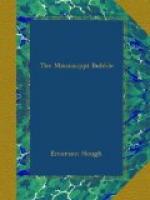The hands of the great waters grasped the frail cockleshell, twisted it about, tossed it, played with it, and claimed it irrevocably for their own. For a few moments it was visible as it passed on down, with the resistless current of the mighty stream. Almost at the verge of the plunge, the eyes watching from the shore saw at a distance the struggle made by the victim. He half raised himself in the boat and threw himself against its side. It was overset. For one instant the cold sun shone glistening on the wet bark of the upturned craft. It was but a moment, and then there was no dot upon the solemn flood.
CHAPTER XIV
THE EMBASSY
“Monsieur! Madame! Pierre Noir! Listen to me! I have saved you! I, Jean Breboeuf, I have rescued you!”
So spoke Jean Breboeuf, thrusting his head within the door of the lodge in which were the remaining prisoners of the Iroquois.
It was indeed Jean Breboeuf who, strolling beyond the outer edge of the village, had been among the first to espy an approaching party of visitors. Of any travelers possible, none could have been more important to the prisoners. Too late, yet welcome even now, the embassy from New France among the Iroquois had arrived. In an instant the village was in an uproar.
The leader of this embassy from Quebec was one Captain Joncaire, at that time of the French settlements, but in former years a prisoner among the Onondagos, where he was adopted into the tribe and much respected. Joncaire was accompanied by a priest of the Jesuit brotherhood, by a young officer late of the regiment Carignan, and by two or three petty Canadian officials, as well as a struggling retinue of savages picked up on the way between Lake George and the Indian villages. He advanced now at the head of his little party, bearing in his hand a wampum belt. He pushed aside the young men, and demanded that he be brought to the chief of the village. Teganisoris himself presently advanced to meet him, and of him Joncaire demanded that there should at once be called a full council of the tribe; with which request the chief of the Onondagos hastened to comply.
Fully accustomed to such ceremonies, Joncaire sat in the council calmly listening to the speeches of its orators, and at length arose for his own reply. “Brothers,” said he, “I have here”—and he drew from his tunic a copy of the decree of Louis XIV declaring peace between the French and the English colonies—“a talking paper. This is the will of Onontio, whom you love and fear, and it is the will of the great father across the water, whom Onontio loves and fears. This talking paper says that our young men of the French colonies are no longer to go to war against Corlaer. The hatchet has been buried by the two great fathers. Brothers, I have come to tell you that it is time for the Iroquois also to bury the hatchet, and to place upon it heavy stones, so that it never again can be dug up.




